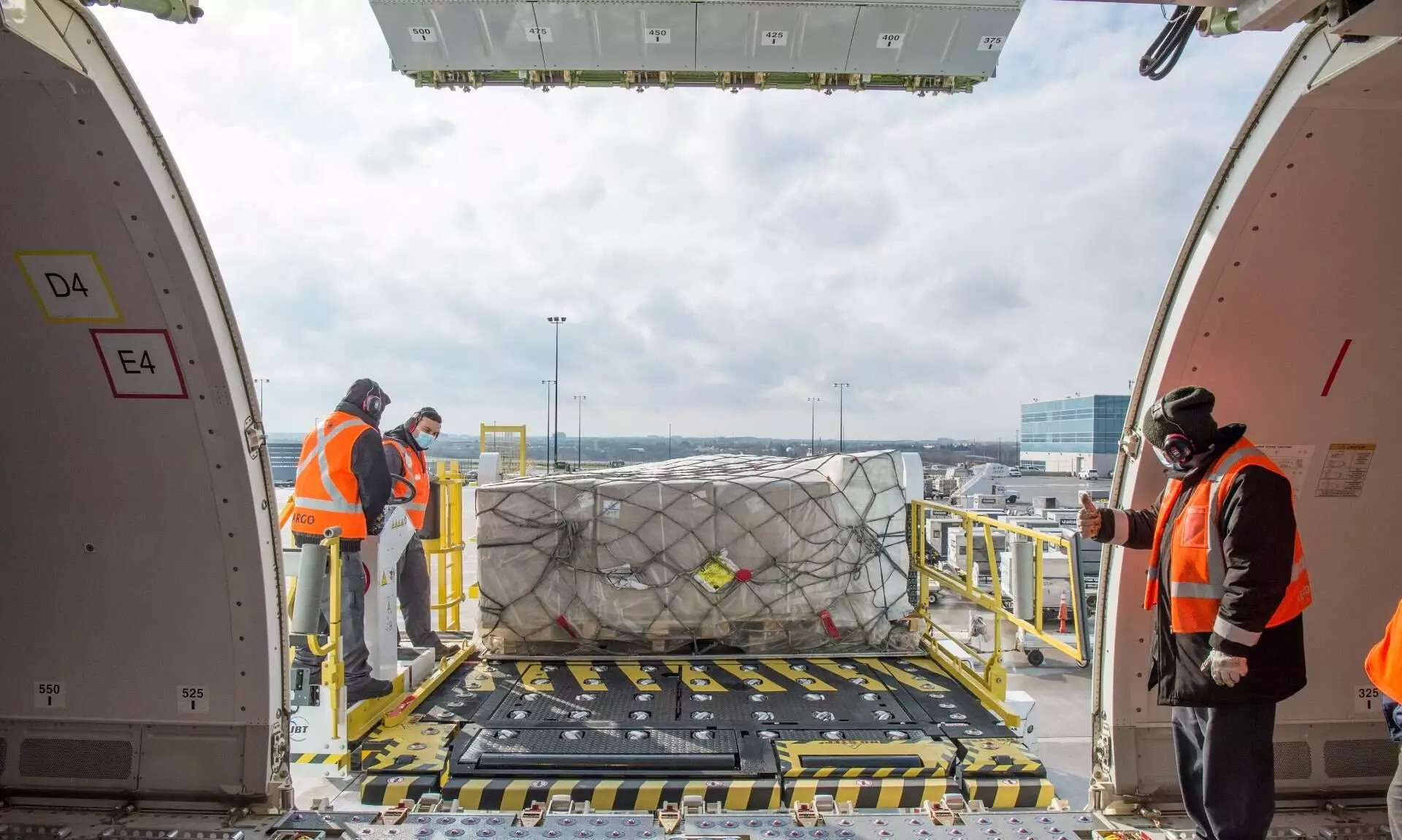
Look past 12 mts: Carriers in the Americas are busy building capacity
The slowdown in the global economy has also affected the air cargo industry of the Americas. However, carriers in the market are looking beyond the 12 months ahead and are busy building capacities for the future.

In April 2023, the global air cargo industry surpassed the pre-Covid-19 levels of capacity for the first time in three years. But on the demand side, it is still down with fears of recession and one of the most affected regions is the Americas, particularly North America. However, airlines in the region are looking beyond the next 12 months and building capacities, particularly the freighter capacity to move the future demand. From South American fruits and vegetables to Canadian e-commerce and from Chilean fresh Salmon to flowers of Latin America, airlines are getting ready.
In its April 2023 global air cargo report, the International Air Transport Association (IATA) noted that North American carriers saw the weakest performance of all regions with a 13.1 percent decrease in cargo volumes compared to the same month in 2022. This was a drop in performance compared to March (10 percent).
“Notably, airlines in the region saw a significant decrease in international demand in April due to a substantial fall in volumes on two major trade lanes: North America-Europe (13 percent) and North America-Asia (9 percent). Capacity decreased 1.5 percent compared to April 2022,” it reads.
Meanwhile, Latin American carriers reported a 1.6 percent decrease in cargo volumes in April 2023 compared to April 2022. This was a performance improvement compared to March (4 percent). Capacity in April was up 8 percent compared to the same month in 2022.
And more recently while mentioning the third week of May 2023, WorldACD reported double-digit percent decreases in year-on-year (YoY) tonnages ex-North America (16 percent) as a notable change.
“Canadians really don't want speed. They don't care about speed. They want reliability. They just want to know when their cargo comes.”
Kirsten de Bruijn, WestJet
Even as global air cargo industry capacity surpassed the pre-Covid-19 level for the first time, IATA’s Director General Willie Walsh noted that the demand environment is challenging to read.
“Tapering inflation is definitely a positive. But the degree and speed at which that could lead to looser monetary policies that might stimulate demand is unclear. The resilience that got the air cargo industry through the Covid-19 crisis is also critical in the aftermath," he said.
For instance, all major airlines in the Americas reported a decrease in cargo revenues in the first quarter of 2023 ended in March including United Airlines (36 percent), American Airlines (38 percent), Delta Air Lines (28 percent), Air Canada (40 percent) and LATAM Airlines (12 percent).
Indeed, there is anxiety around the constantly changing market trajectory. For example, Kirsten de Bruijn, executive vice president cargo at the Canadian airline WestJet, opined that if the launch of their freighters had been one year before they would have been with little less anxiety than today.
WestJet Cargo and the GTA Group inaugurated the launch of three 737-800 Boeing Converted Freighters in Toronto in April 2023.
In an interview before the freighter launch to The STAT Trade Times’ Cargo Masterminds series, she said, “We understand that it is a competitive landscape that we are starting in. The market is not going down but it is normalising which is going to happen at some point.”
She also mentioned that the Calgary, Alberta-based airline tailored the freighter schedule in a way that it can tap into point-to-point domestic traffic but it also assists in optimising the wide-body belly.
During her keynote at a panel discussion at air cargo Europe (May 9-12, 2023), de Bruijn delved deep into the operational challenges in Canada.
“WestJet invested in four B737 freighters. Canada is twice the size of the European Union and you think it would make sense. But it is not that easy to start an airline in this market specifically because there are so many aircraft on order or in some cases certain airlines are de-ordering.”
Talking about the nature of e-commerce ordering in Canada, with which she is trying to fill the freighters, she noted that “Canadians really don't want speed. They don't care about speed. They want reliability. They just want to know when their cargo comes. So the business model that we are following right now is on-time performance and quality rather than speed.”
“We will end this year with seven B767 freighters and next year with nine. This will help us to change our offerings with North America, Europe and Latin America.”
Janet Wallace, Air Canada
Another airline that is trying to expand its freighter network is Air Canada Cargo. The airline already operates six B767 freighters, two of which were received in May 2023. It recently added Punta Cana in the Dominican Republic to its worldwide freighter network, following services to San José, Basel, Liege, Dallas, Atlanta and Bogota.
Janet Wallace, managing director, cargo operations & transformation, Air Canada, in a recent interview with The STAT Trade Times, said, “The freighters really change our network. We will end this year with seven B767 freighters and next year with nine B767s. This will help us to change our offerings with North America, Europe and Latin America. Next year we will have two Boeing 777 freighters. This will allow us to better serve the transpacific.”
“We look to operate these freighters across the equator because the production of perishables is almost seasonless there. It happens all year round,” she added.
She also noted that the airline has been working for a couple of years to build an e-commerce business nationally across Canada.
“We are working very closely with software development companies because they are key in e-commerce handling as customers demand transparency, speed and they want to see all key milestones,” she said.
“Most of the products coming out of Latin America are perishables. The flowers from the northern part, fish from the south and fruits & vegetables from other countries.”
Gabriel Oliva, Avianca Cargo
Even though downturn trends are too dramatic because it happens too quickly, Gabriel Oliva, chief executive officer, Avianca Cargo, who recently spoke in Cargo Masterminds opined that everybody knew this was going to come.
The Colombia-based South American airline has eleven freighters beyond the belly capacity of its widebody aircraft operating in South and North America as well as Europe from its hub in Bogotá. It became the first airline in the Americas to gain three IATA CEIV certifications (Fresh, Pharma, Lithium).
“Next year we will be bringing on board four A330 freighters because the customers are demanding more capacity. Last year we increased 30 percent of our capacity between North America and South America.”
Perishables account for 50 percent of Avianca Cargo’s total cargo movements and it is still a big priority for Oliva in terms of growth.
As he puts it “Most of the products coming out of Latin America are perishables. The flowers from the northern part, fish from the south and fruits and vegetables from other countries. That’s why we became the first in the Americas to gain IATA CEIV Fresh certification. But right now we are not as strong in salmon coming out of Chile. We have five freighter frequencies coming out of Chile. Hopefully, we want to make it daily by the end of this year.”
Another airline that made changes in its fleet is LATAM Airlines. It is in the process of its fleet modernisation, received its 17th B767 freighter in March and plans to have 20 B767 freighters by 2024.
“We used to have a freighter fleet of about 12 B767s and four B777s. We went through a valley when we decided that we have to restructure the fleet, let go of all the B777s because they were too big for the South American market and move back to an all-B767 fleet,” said, Andres Bianchi, chief executive officer, LATAM Cargo in a recent interview with The STAT Trade Times.
“Your fleet needs to follow your strategy. And when you let your fleet drive your strategy, you are prone to make mistakes. So we went back to the aircraft that is best for the region and started investing in that. We also decided that we wanted to use the aircraft that we had. We converted the B767 passenger aircraft and we are happy with those conversions,” he added.
While talking about the current market conditions and the challenges of having new aircraft, Bianchi expressed his confidence that the air cargo market of 2024 and 25 would be better.
“Comparisons are always tough because we are coming from a very particular period of time. The pandemic has changed the dynamics. We are going through a rough patch because of slower economic growth and the fear of recession and changes in buying habits are affecting our demand. In air cargo, it is always healthy to look past the 12 months in front of you,” he said.
The air cargo market of the Americas is getting even more competitive with these aircraft and capacity coming in. The current downturn is part of the cycle and beyond the next twelve months, the industry is gearing up for an upward trend and the cargo they have to move.
This was originally published in the June 2023 issue of The STAT Trade Times.


